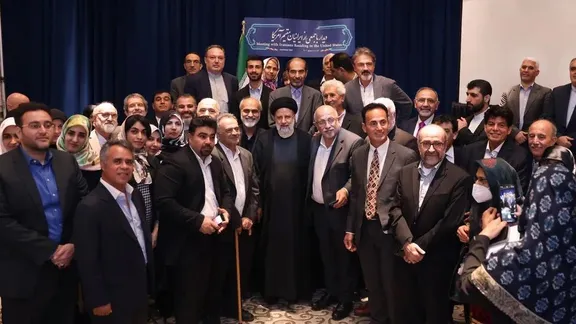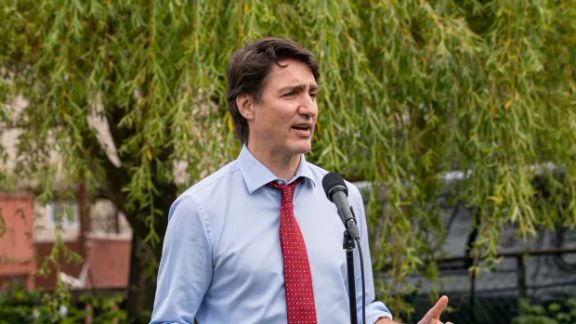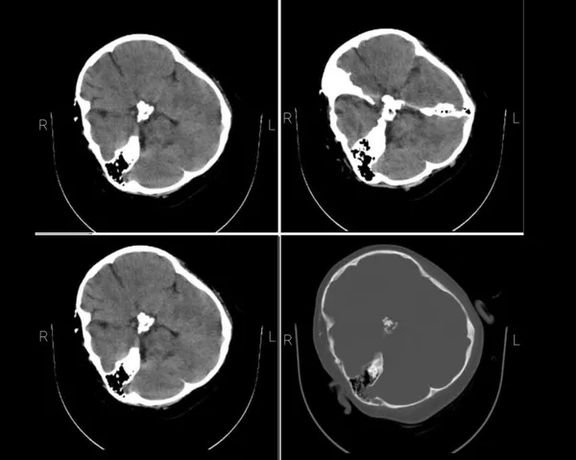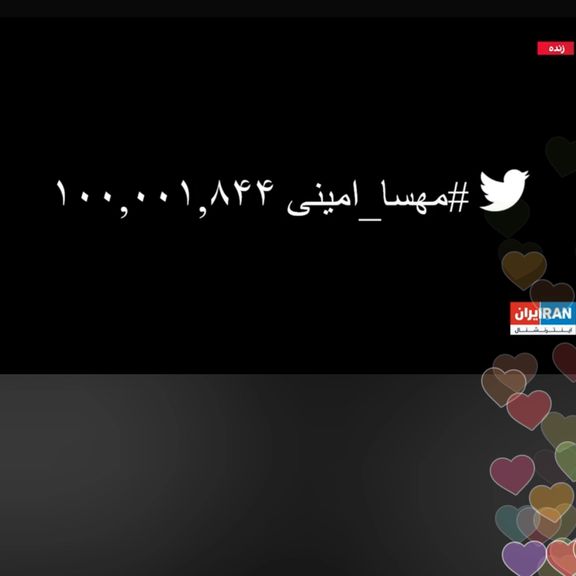Iranian Doctors' Group In US Sacks President For Meeting With Raisi

The Iranian-American Medical Association has sacked its president because he held a meeting with Iranian President Ebrahim Raisi during his visit to New York City.

The Iranian-American Medical Association has sacked its president because he held a meeting with Iranian President Ebrahim Raisi during his visit to New York City.
The association issued a statement on Sunday saying that the Iranian-American community will no longer be silent in the face of appeasement of and association with “this evil regime.”
The Board of Directors and Board of Trustee's of the Iranian-American Medical Association (IAMA) said in its statement that Dr. Shervin Mortazavi’s meeting with Raisi – which was revealed following a photo of the meeting – was not scheduled by the association, adding that the IAMA was completely unaware of such action.
“Dr. Mortazavi has publicly stated this was a private engagement that had nothing to do with his role at IAMA,” the statement read.

Strongly condemning the meeting, IAMA said that “Regardless of the reason, this was not acceptable by the Board members, hence accordingly and unanimously the Board asked him (Mortazavi) to resign immediately.”
It added that the IAMA has also asked him “to distance himself completely from our organization, which during its 30 years history has solely been a scientific, humanitarian, non-political, non-religious, and non-profit organization.”
“We, as IAMA members, like other Iranians all over the world, strongly condemn what has happened to Masa Amini, a young innocent girl as a distinct violation of human rights,” it said, referring to the death of the 22-year-old Kurdish girl whose death in custody of hijab police has triggered nationwide unrest in Iran.

Germany summoned Iran’s ambassador on Monday over Tehran’s heavy-handed crackdown on the popular protests across the country, triggered by the death of a hijab victim.
Tehran’s envoy was called as the spokesperson of the German Foreign Ministry said that they would explore all options with other European Union countries about possible sanctions on the Islamic Republic over its suppression of the demonstrations.
On Sunday, the EU foreign policy chief slammed Iran’s handling of protests as unjustifiable and unacceptable, hinting that the European Union may issue sanctions over the crackdown.
In a statement on behalf of the EU, Josep Borrell said that “despite repeated calls for restraint, the response of the Iranian security and police forces to demonstrations has been disproportionate and resulted in the loss of lives as well as a large number of injuries.”
“The EU and its member states urge the Iranian authorities to strictly abide by the principles enshrined in the International Covenant on Civil and Political Rights, to which Iran is a party,” he said, calling on the Islamic Republic “to immediately stop the violent crackdown on protests and ensure internet access, as well as the free flow of information.”
“The European Union will continue to consider all the options at its disposal ahead of the next Foreign Affairs Council, to address the killing of Mahsa Amini and the way Iranian security forces have responded to the ensuing demonstrations,” read the statement.

Canada will impose sanctions on those responsible for the death of 22-year-old woman Mahsa Amini, including Iran's so-called morality police and its leadership, Canadian Prime Minister Justin Trudeau said on Monday.
"We've seen Iran disregarding human rights time and time again, now we see it with the death of Mahsa Amini and the crackdown on protests," Trudeau told reporters in Ottawa.
Mahsa Amini, from Iran’s western city of Saqqez, was arrested in Tehran on September 13 and two hour later transferred to a hospital in coma with severe trauma to her head. She died three days later, while still in coma.
Her death sparked protests in Iran that quickly spread around the country. Young protesters have held demonstrations every evening since September 18 in the capital Tehran, defying Iran’s notorious security forces that in November 2019 killed at least 1,500 protesters in less than a week.
"Today, I'm announcing that we will implement sanctions on dozens of individuals and entities, including Iran's so called morality police," Trudeau said, moments after similar remarks by his foreign minister, Melanie Joly, during her address to the United Nations General Assembly in New York.
The United States imposed similar sanctions last week and the European Union condemned Mahsa Amini’s death in police custody and reports say it may also impose sanctions.

An eyewitness has told Iran International that Mahsa Amini who died in police custody had told her in a detention room that an officer had hit her on the head.
The eyewitness who did not want to be identified because of her safety in Iran had also been arrested for “improper hijab” and saw Mahsa Amini in the police station before she collapsed and taken to hospital.
The 22-year-old whose death sparked the largest antigovernment protests in Iran, was complaining of pain in her head. When the eyewitness asked her the reason, she told her that police officers had hit her on the head.
The eyewitness told Iran International that she heard from others in the police station that Mahsa Amini had hesitated to step out of the police van that brought her to the station. At that point a ranking police officer had hit her on the head and forced her out of the van.
In the police station waiting room, Mahsa repeatedly asked female agents about why she was arrested as her attire seemed proper. They aggressively dismissed her questions and complaints. At one point she collapsed to the ground and other women began screaming for medical help. The female guards dismissed her unconsciousness saying that she was pretending to be ill to get out of jail.
Then, after 30 minutes an unexperienced medic showed up, but Mahsa’s face began to turn white, and she seemed to enter a coma.

Female detainees began to scream and after a while another medic showed up who also seemed unexperienced, and finally after an hour a doctor showed up who tried to resuscitate her and after another 30 minutes an ambulance arrived to take her to hospital. In total, about two hours elapsed before Mahsa was taken to hospital, where she died three days later, while still in coma, on September 16.
The eyewitness said that those present asked guards many times to inform Mahsa’s brother, who was waiting outside the police station, about her condition, but the guards refused and acted aggressively toward the other detainees.
According to her, if police officers had not acted with indifference and Mahsa had been taken to hospital immediately, she would not enter a coma.
Doctors told Iran International earlier that all medical signs pointed to severe blows to Mahsa's head that fractured her skull, leading to a coma, and that they could not do anything to save her.
After Mahsa passed away, people in her hometown, Saqqez, and some other cities nearby, as well as around her hospital in Tehran began protests. The demonstrations spread to other cities and towns around Saqqez in western Iran and by September 18 protests spread to the capital, Tehran and other urban areas around the country.
At least 54 protesters were reported killed until September 24, but no one has the final toll, as the government rarely announces real figures.

Support for protests in Iran is still rising among international celebrities, with Justin Bieber joining the crowd as hijab victim Mahsa Amini’s hashtag has reached 100 million.
The Canadian popstar used his platform of about 260 million followers on Instagram to raise awareness about the current uprising in Iran with a story of Iranian protesters holding a photo of Mahsa Amini, whose tragic death in the custody of hijab police triggered worldwide rallies against the Islamic Republic.
The Persian hashtag that has been trending in support of Mahsa, also known as Zhina or Jina, has been retweeted more than 100 million times, and still counting.
This is by far the highest number of retweets in the history of Twitter, about 25 times more than the trendiest hashtags on the social media platform so far. This has been achieved thanks to numerous celebrities and political figures as well as human rights activists and organizations.
Iranian celebrities, both from inside the country and abroad as well as athletes from many national teams have expressed support for the uprising despite repeated threats and warning by authorities about banning them from their professions.
Several foreign singers and artists have also dedicated pieces to the 22-year-old Mahsa, including pop singer Chris de Burgh and community-driven rock star Yungblud.
Legendary co-founder of Pink Floyd Roger Waters has posted a few times since last week, expressing anger over Mahsa’s death.

As Tehran provides military drones to Moscow, an Iranian energy expert says Moscow has never invested a penny in Iran’s energy sector, despite contracts and deals.
Iran’s oil and gas industries that have remained its main financial providers, have been deprived of Western investments and technology since the 1980s due to Tehran’s anti-Western foreign policy. As a result, the government has been constantly advertising the great benefits of cooperation with Russia and China and hinting at tens of billions of dollars in possible trade and investments.
Morteza Behruzifar, an energy expert in Tehran told the ILNA news website recently that a recent memorandum of understanding with Russia for building LNG terminals in Iran and for swapping natural gas will not lead anywhere. Russia has never invested in Iran’s energy sector perhaps because it perceives Iran as a potential competitor, especially in exports to Europe.
In July, Iran’s national oil company announced it had reached a $40-billion agreement with Russia’s Gazprom to develop joint energy projects, including pumping Russian gas to Iran for a potential swap deal. Ostensibly, Iran will deliver the gas to Russian customers, but this is unrealistic because none of Iran’s neighbors currently buys Russian gas, except for Turkey that has its own direct pipeline.
A gas swap would have made sense if Iran had liquified natural gas (LNG) technology and terminals to export gas to markets such as Europe. The other theoretic possibility would be for Russia to help build this technology, but Moscow itself must rely on Western companies to build an LNG export infrastructure.
“Until now Russia has not been able to build even the smallest LNG plant for itself,” Behruzifar said, adding that there are just a handful of Western firs that are capable of infrastructure for LNG export. “We should not have any expectation that Russia can help us” in this field he maintained.
He also explained that the only technology Russia and Iran have available is to build underwater pipelines in shallow seas, such as a segment of the Persian Gulf between Iran and the United Arab Emirates, but Abu Dhabi would hardly agree to that given outstanding security and regional issues with Tehran.
India is another possible market for Russian gas through Iran, but the problem is that a pipeline must pass through Pakistan, an option New Delhi does not like because it will establish a leverage for Islamabad.
The other possible rout for exports would be a pipeline to Oman, but that requires deep-water technology that both countries do not have. In fact, Nord Stream 2 was built by European companies, which will not deal with Iran and Russia, both under stringent sanctions.
“Even before the war with Ukraine [Russia] had not invested a penny in Iran,” abiding by all United States’ sanctions, Behruzifar said.
Russia has always been Iran’s competitor in the energy sector, never its partner, the analyst said. It would never allow Iran to become a natural gas exporter to Europe, he added.
However, the clerical government in Iran having failed to normalize relations with Washington has doubled down on its policy of partnering with Russia. Supreme Leader Ali Khamenei in a meeting with Vladimir Putin in Tehran in July praised his “initiative” of invading Ukraine, describing it as a necessary reaction to the West and NATO.